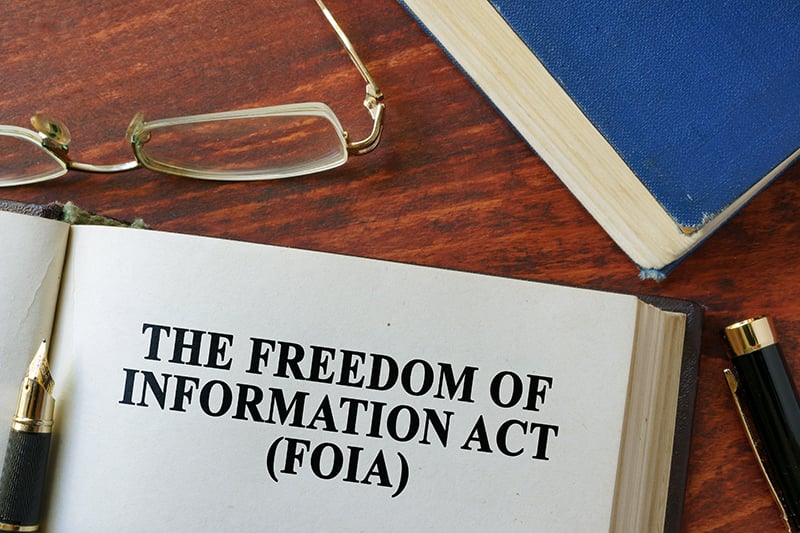Attorneys have many tools at their disposal during the discovery process, but one that often goes criminally overlooked is the FOIA request. Although it is not applicable to all cases and lawsuits, a FOIA request can be incredibly helpful when legal teams believe government agencies possess information or documents that could support their cases.
As such, knowing how to file a FOIA request is crucial. There are many pitfalls and considerations to take into account, and you don’t want to make a critical misstep when the time comes to play the FOIA card. Here’s a rundown on everything you need to know about FOIA requests, including how to make one.
What is a FOIA request?
A FOIA Request or public records request is based on the 1966 Freedom of Information Act (FOIA), which requires federal agencies in the United States to disclose stored documents to the public upon request. Since its inception, the goal of this law has always been to increase transparency regarding government operations and boost public trust.
The scope of the Freedom of Information Act has changed over the years, with new amendments expanding its scope or, at times, including additional exemptions. Of particular concern to attorneys is the FOIA Improvement Act of 2016, which requires United States government agencies to produce requested documents in electronic formats. The shift towards digitization in the FOIA process has only further complicated e-discovery needs for lawyers who wish to use government documents as evidence in certain cases. The shift towards digitization in the FOIA process has only further complicated e-discovery needs for lawyers who wish to use government documents as evidence in certain cases.
Although the public at large may think of FOIA as a tool to get a look at the inner workings of the government and shine a light on past misdeeds, attorneys can use this tool to support their arguments and win cases. For instance, if a client is a former federal employee and is suing the United States government for wrongful termination, a FOIA request could unearth all kinds of valuable information pertaining to the litigant’s case.
FOIA doesn’t cover all information and documentation, however. Requests for confidential records containing sensitive information such as state secrets will likely be denied or, at best, provided with significantly redacted documents.
Bottom line: Knowing how to file a FOIA request is essential if you ever need to search for records stored in government databases.
Who Can Make a FOIA Request?
Yes, anyone - lawyers, journalists and average citizens included - can submit a FOIA request. Attorneys can also file requests as representatives of organizations and corporations. Media outlets frequently have attorneys represent them during these processes, for instance.
That doesn’t necessarily mean that every person should expect a similar outcome, though. Well-known news media groups are more likely to receive a prompt response than your everyday citizen. Government agencies and record keepers have been known to waive processing fees and expedite document retrieval for organizations and entities that have a fair amount of clout.
On the other hand, some agencies have a reputation for charging excessive fees as a way to discourage people from submitting FOIA requests. State-level agencies are even more notorious for setting exorbitant prices for public record services. This New York Department of Health request is a particularly notable example, with the agency demanding $76,000 to produce data only available on microfiche.
States are free to set their own fees for public record requests, and the cost of similar requests will likely vary significantly depending on the local government or agency. Some states may tack on additional charges for labor, for instance. In one example, a request for identical records received a $34 bill when filed in New Mexico and more than $1,000 when submitted to the Oregon state government.
When it comes to civil cases, it’s always best that lawyers submit FOIA requests for their clients to speed up the process and ensure all paperwork and documentation is in order.
Can a FOIA Request Be Denied?
Absolutely. The most likely scenario an attorney will encounter is that the agency record they’re looking for doesn’t actually exist. Also, as mentioned, there are certain circumstances in which a government agency is within its rights to turn down a FOIA request. There are nine exemptions, in particular, to be aware of:
- Documents that are protected by executive order.
- Documents that are solely related to government personnel rules.
- Documents made exempt through a specific statute.
- Trade secrets or commercial, financial, and proprietary informationare considered privileged.
- Inter-agency or intra-agency communications that have been disclosed in other legal disputes.
- Medical or personal information is protected under federal law, such as the Health Insurance Portability and Accountability Act.
- Law enforcement records whose disclosure would impede investigations, compromise legal proceedings, reveal the identity of a confidential informant, or risk national security, among other stipulations.
- Documents related to agencies supervising or regulating financial institutions.
- Oil well data.
Additional exemptions have been included and removed over the years. Individual agencies may have their own FOIA regulations that expand upon the ones outlined above. It’s important to keep up with all changes to FOIA rules to avoid unnecessary paperwork and processing time.
Where Do You Start When Filing a FOIA Request?
Submitting a FOIA request is a multi-step process, requiring a fair amount of legwork to avoid excessive processing times, expensive fees, or discouraging denials.
Find the Right Agency Contact
Assuming you have already confirmed that the requested information cannot be obtained through some other, more efficient avenue, your first step is to figure out who to send your FOIA request to.
Every federal agency has a dedicated staff member who handles FOIA requests. Often, agencies and the departments they belong to will have separate officers managing FOIA submissions. Look up the proper individual for your particular case using the government’s directory.
Review Agency Regulations
Different agencies in the United States have their own processes for responding to FOIA requests. Some may have a far more limited scope, while others might have opportunities to expedite your submission. The cost of a FOIA request varies from agency to agency as well. In virtually all cases, attorneys will be required to pay fees upfront, but there are some instances where you can be granted a fee waiver. For example, a fee waiver can be granted in the case that the disclosed information is in the public interest and contributes to the public understanding of government activities. The requesting organization must be affiliated with an educational or noncommercial scientific institution, and the information must also be used for scholarly purposes and notfor commercial use. Brushing up on the various nuances of federal agencies’ FOIA workflows can save you a lot of time, money, and frustration. The Department of Justice outlines several scenarios and additional information.
Also, keep in mind that states have their own public access laws if the records you’re looking for are held by a local or state-level agency. For instance, Florida leads the nation in the number of exemptions that could affect a FOIA request. The Sunshine State has more than 1,000 exemptions in place - Tennessee comes in at No. 2 with a little more than half that figure.
Write a Request Letter
There's no official form that needs to be filled out to request records from a government agency. There is, however, a basic process that lawyers must follow. Attorneys are required to send a written request letter to the agency in question to search for records.
The specific information that must be included in that request letter, as well as the format through which it is submitted, can differ from one agency to the next. Some allow online submissions, while others require a physical copy. Check with the federal agency in question before filling out your submission.
One important tip to follow is to be as specific as possible with your request. Include the search terms you would like to use and refine your request to the point where it requires less than two hours of search time. The more details you can provide and the more you narrow your record search, the easier it will be to hunt down the information and respond to your case.
Wait For a Response
Playing the waiting game with federal agencies is an unavoidable part of the FOIA process. Generally speaking, record keepers have 20 days to respond to a FOIA request, unless there are “unusual circumstances” that get in the way. Agencies have been known to file extensions when dealing with large volumes of data or documents stored in different locations. That 20-day deadline isn’t always ironclad.
Response times for state and local requests can vary significantly. California, for instance, has one of the shortest windows in the country, giving record keepers 10 days to reply to a submission. Unfortunately, there’s no way to check on the progress of your request. You just have to wait until your records are ready.
Appeal if Necessary
If your request has been denied, you have the option to appeal. In general, appeals should be submitted within 30 days of receiving notification of that decision. Like many other aspects of the FOIA process, the exact stipulations and workflows will depend on the agency in question.
At the state level, you might find that there is no formal appeal process in place. California is one notable example. The only recourse in those instances is to take the agency to court. On the other hand, some states, like New York, have an independent board to review appeals and make an unbiased decision.
Filing a FOIA request may seem like a headache, but it can make or break a case in some instances. Now that electronic documents have become the standard format for FOIA-gathered information, every discovery strategy should account for this process. To learn more about e-discovery best practices, be sure to review our e-discovery manifesto, complete with a comprehensive checklist.
Frequently Asked Questions
- How long does it take for a government agency to respond to a FOIA request?
Federal agencies typically have 20 days to respond to a FOIA request. However, response times can vary based on the complexity of the request and the volume of documents involved.
- What are the fees associated with filing a FOIA request?
Fees vary by agency and the amount of work required. Some agencies charge for document retrieval and processing, while others may waive these fees under specific circumstances.
- Can I appeal a denied FOIA request?
Yes, if your FOIA request is denied, you can appeal the decision, usually within 30 days. However, the appeal process may differ by agency.
- What information should be included in a FOIA request letter?
When writing a FOIA request letter, include a clear description of the records you wish to access, the time frame, and any other details that can narrow down the search.
- What types of documents are exempt from a FOIA request?
Certain documents are exempt, such as those related to national security, law enforcement investigations, personal privacy, and confidential business information.
If you found this article interesting, be sure to subscribe you and your team to our monthly blog distribution email. This email list is solely for blog distribution purposes, and we promise to only send one email per month. To subscribe, simply scroll down and fill out the "Subscribe" form below the comment box.
-1.png?width=400&height=164&name=DWRLogoClassic%20-%20Copy%20(2)-1.png)









Comment On This Article